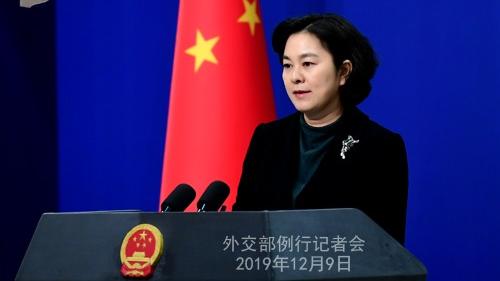 Foreign Ministry spokeswoman Hua Chunying speaks at a daily news conference on Dec 9, 2019. (PHOTO / CHINESE FOREIGN MINISTRY'S WEBSITE)
Foreign Ministry spokeswoman Hua Chunying speaks at a daily news conference on Dec 9, 2019. (PHOTO / CHINESE FOREIGN MINISTRY'S WEBSITE)
BEIJING — China on Monday urged relevant countries to view the novel coronavirus epidemic rationally and calmly and form science-based and measured responses.
Foreign Ministry spokesperson Hua Chunying made the remarks when asked to comment on the situation that certain countries have successively announced restrictions on the entry of Chinese citizens. Among them, the United States has raised its travel advisory for China to the highest level and has temporarily banned all foreigners who have traveled to China in the past 14 days from Feb. 2.
But in the meantime, some countries, in particular the United States, have inappropriately overreacted, which certainly runs counter to WHO advice
Hua Chunying, Foreign Ministry spokesperson
Acting with a high sense of responsibility to people's health, the Chinese government has taken the most comprehensive and strict prevention and control measures after the outbreak of the epidemic, many of which have far exceeded what International Health Regulations required, said Hua.
READ MORE: WHO public health emergency: What to know
Hua quoted the Director-General of the World Health Organization (WHO), Tedros Adhanom Ghebreyesus as saying, China is setting a new standard for outbreak response. In the same speech, he said explicitly that declaring a public health emergency of international concern is not a vote of no confidence in China. On the contrary, the WHO continues to have confidence in China's capacity to control the outbreak. There is no reason to take unnecessary measures restricting international travel and trade.
Noting most countries appreciate and support China's efforts to fight the novel coronavirus, Hua said China understands and respects them when they adopt or enhance quarantine measures at border entries. "But in the meantime, some countries, in particular the United States, have inappropriately overreacted, which certainly runs counter to WHO advice."
"The US government hasn't provided any substantial assistance to us, but it was the first to evacuate personnel from its consulate in Wuhan, the first to suggest partial withdrawal of its embassy staff, and the first to impose a comprehensive travel ban on Chinese travelers. (The US actions) could only create and spread fear, setting a bad example for others," said the spokesperson.
US media and experts said that the US government's restrictions on China are precisely what the WHO rejects, that the United States is turning from overconfidence to fear and overreaction
Hua said even US media and experts doubted the government's decision. They said that the US government's restrictions on China are precisely what the WHO rejects, that the United States is turning from overconfidence to fear and overreaction, and that banning the entry of foreigners who traveled to China in the past 14 days is suspected of infringing on civil rights rather than reducing risks of virus spreading, according to Hua.
Hua cited a recent report from the US Centers for Disease Control and Prevention (CDC) as saying that the flu from 2019-2020 season has caused 19 million infection cases and at least 10,000 deaths in the United States. By contrast, by Feb. 2, 17,205 cases of novel coronavirus (2019-nCoV) infection had been confirmed in China with 361 deaths, and 475 patients had been cured, while there are only 11 confirmed cases in the United States.
"The contrast is thought-provoking," Hua said.
She pointed out that the Canadian minister of health said Canada would not follow the US to impose travel restrictions on Chinese or foreign nationals who had been to China, which was baseless. "It is a sharp contrast to the US behaviors," Hua said.
Noting that the destinies of all countries are closely linked in a globalized world, Hua said in the face of a public health crisis, countries should work together to overcome the difficulties, rather than resort to beggar-thy-neighbor practice, let alone take advantage of others' difficulties.
ALSO READ: Virus: China sees 2,829 new confirmed cases, 57 new deaths
According to Hua, since Jan. 3, the Chinese side has notified the United States of the epidemic and China's control measures altogether 30 times. Chinese Center for Disaster Control and Prevention and US Centers for Disease Control and Prevention held many rounds of communications on the outbreak. On Jan. 29, China's National Health Commission (NHC) replied through an official channel to the US side that China welcomes it to join a WHO joint expert group. The United States thanked China for this on the same day. On Jan. 31, the United States told NHC that it had contacted WHO headquarters and submitted a list of US experts wishing to join the group.
"We hope relevant countries will make reasonable, calm and fact-based judgments and responses," said the spokesperson, adding that China will enhance cooperation with the WHO and the international community in an open, transparent and highly responsible manner.
"We have the confidence and capability to win this battle as soon as possible," she said.


